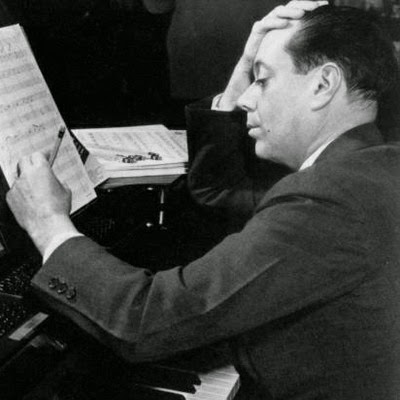Because I grew up watching movie musicals, I love all those old songs. For the last few years, I've noticed that the Smithsonian hosts lectures on songwriters and performers of that era. I wrote about their Ella Fitzgerald event last year. In addition to that one, I attended two lectures about American songwriters George Gershwin and Cole Porter, both hosted by pianist Robert Wyatt.
Gershwin, By George!, Smithsonian Institution, National Museum of the American Indian, March 27, 2015
My love for George Gershwin (1898-1937) probably stems from my love for An American in Paris, the 1951 Best Picture Oscar winner with an exclusive Gershwin soundtrack. I also saw Hershey Felder's inspiring one-man show George Gershwin Alone at Ford's Theatre in 2003.
George Gershwin was an amazing composer and musician, a prodigy who accomplished so much in his 37 years, from classical works and piano solos to musical theatre scores and film songs. Together with his lyricist brother Ira, they formed one of the best known songwriting teams of the 20th century. I bet you know some of their songs [click on the titles to hear them]: "But Not for Me," "Embraceable You," "Nice Work If You Can Get It," "They Can't Take That Away From Me," and "Someone To Watch Over Me."
When George Gershwin first started complaining about headaches, his friends assumed he was being overly dramatic to get attention, but he died of a brain tumor shortly thereafter. About that, the composer's writer/friend John O'Hare appropriately said, "George Gershwin died on July 11, 1937, but I don't have to believe it if I don't want to."
What attracted me most to Robert Wyatt's event, Gershwin, By George!, was that it included his performance on piano of Gershwin's orchestral masterpiece "Rhapsody in Blue." You can't get much better than this piece of music, which is always associated with the vibrancy of New York City living. Hearing it live is a treat! While I waited for it, I learned some things about George Gershwin during Mr. Wyatt's informative lecture:
- George Gershwin's parents bought a piano when George was 10. He sat on the bench and began to play it before ever having a lesson, so his parents found him a teacher, Charles Hambitzer, who later said, "I have a new pupil who will make his mark if anybody will. The boy is a genius."
- Growing up, he loved listening to ragtime composer/pianist Scott Joplin.
- He wrote the opera Porgy and Bess, based on the book by DuBose Heyward. Although not a songwriter, the author wrote lyrics to some of its most memorable songs, including "Summertime," "A Woman's a Sometimes Thing," and "My Man's Gone Now," but George's brother Ira got all the credit.
- He wrote "An American in Paris" before ever having gone to Paris and played it in Carnegie Hall, New York, in 1928. (Click the song's title to hear George Gershwin himself performing this piece.)
- "Our Love Is Here to Stay" is the last song George Gershwin ever wrote. Knowing that makes his brother's lyrics all the more poignant, don't you think? Below, hear the song, performed by Gene Kelly and Leslie Caron in An American in Paris.
Cole Porter: Sophisticate of American Song, Smithsonian Institution, National Museum of American History, July 22, 2014
My love for Cole Porter (1891-1964) doesn't come for a specific musical but a bunch of them, like Kiss Me Kate (1953) and Silk Stockings (1957). From there, I checked out MGM's 1946 Cole Porter biography Night and Day, starring Cary Grant, though it's pretty inaccurate in that Old Hollywood sort of way. A better biography is De-lovely (2004), starring Kevin Kline.
Born into wealth, Cole Porter never needed money. He pursued music and found success as a composer in musical theatre. Although gay, he married friend Linda Lee Thomas, and – content with their platonic relationship – they lived lavishly and traveled abroad. A horse-riding accident in 1937 led to 33 operations on his legs and constant pain for the rest of his life. Some of his many popular tunes include the following [click on the titles to hear them]: "Let's Do It, Let's Fall in Love," "Night and Day," "Anything Goes," "I Get a Kick Out of You," "It's De-Lovely," "I've Got You Under My Skin,""My Heart Belongs to Daddy," "So In Love," "I Love Paris," "All of You," and "True Love."
Although Robert Wyatt didn't play piano during his lecture, Cole Porter: Sophisticate of American Song, he provided some great archival footage and trivia. Here are some interesting things that I learned:
- Cole Porter was very smart. Originally from Peru, Indiana, he went to school on the East Coast and didn't contact his family the entire time he was there. He was valedictorian of his class at the Worcester Academy in Massachusetts. He went to Yale University, where he participated in lots of extracurricular activities but didn't bother with his studies. Then, he was nearly expelled from Harvard Law School but was transferred to music school instead.
- He was very good friends with composer Irving Berlin, but composer Lorenz Hart was not a fan. He also didn't like Frank Sinatra's versions of his songs.
- He wrote at least 800 songs, and "Love for Sale" was his favorite.
- After he wrote "Your the Top," everyone asked him to add more verses to it; he added 300 lyrics in a week. (Click the song's title to hear Cole Porter himself perform it.)
- After his horse-riding accident, he named his left leg Geraldine and his right leg Josephine. (Hallelujah for his sense of humor!)
- In 1948, his musical Kiss Me Kate became the first to win the Tony for best musical. Below, hear the song "Too Darn Hot," performed by my favorite tap-dancing lady, Ann Miller, from the film version of Kiss Me Kate.




No comments:
Post a Comment